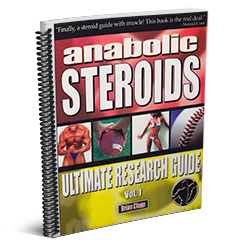Anabolic steroid-induced hepatotoxicity: Is it overstated?
Clin J Sport Med 1999 Jan;9(1):34-9 (ISSN: 1050-642X)
Dickerman RD; Pertusi RM; Zachariah NY; Dufour DR; McConathy WJ
The Department of Biomedical Science, University of North Texas Health Science Center, Fort Worth 76107-2699, USA.
OBJECTIVE: There have been numerous reports of hepatic dysfunction secondary to anabolic steroid use based on elevated levels of serum aminotransferases. This study was conducted to distinguish between serum aminotransaminase elevations secondary to intense resistance training and anabolic steroid-induced hepatotoxicity in elite bodybuilders.
DESIGN: This was a case-control study of serum chemistry profiles from bodybuilders using and not using anabolic steroids with comparisons to a cohort of medical students and patients with hepatitis.
PARTICIPANTS: The participants were bodybuilders taking self-directed regimens of anabolic steroids (n = 15) and bodybuilders not taking steroids (n = 10). Blood chemistry profiles from patients with viral hepatitis (n = 49) and exercising and nonexercising medical students (592) were used as controls.
MAIN OUTCOME MEASURES: The focus in blood chemistry profiles was aspartate aminotransferase (AST), alanine aminotransferase (ALT), gamma-glutamyltranspeptidase (GGT), and creatine kinase (CK) levels.
RESULTS: In both groups of bodybuilders, CK, AST, and ALT were elevated, whereas GGT remained in the normal range. In contrast, patients with hepatitis had elevations of all three enzymes: ALT, AST, and GGT. Creatine kinase (CK) was elevated in all exercising groups. Patients with hepatitis were the only group in which a correlation was found between aminotransferases and GGT.
CONCLUSION: Prior reports of anabolic steroid-induced hepatotoxicity based on elevated aminotransferase levels may have been overstated, because no exercising subjects, including steroid users, demonstrated hepatic dysfunction based on GGT levels. Such reports may have misled the medical community to emphasize steroid-induced hepatotoxicity when interpreting elevated aminotransferase levels and disregard muscle damage. For these reasons, when evaluating hepatic function in cases of anabolic steroid therapy or abuse, CK and GGT levels should be considered in addition to ALT and AST levels as essential elements of the assessment.





 Reply With Quote
Reply With Quote
